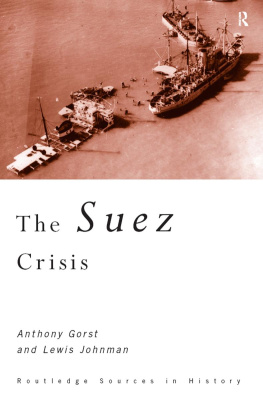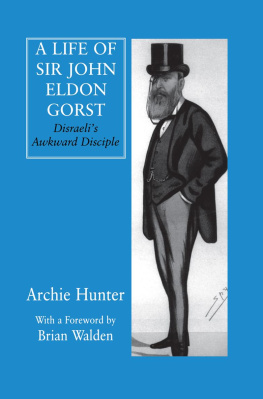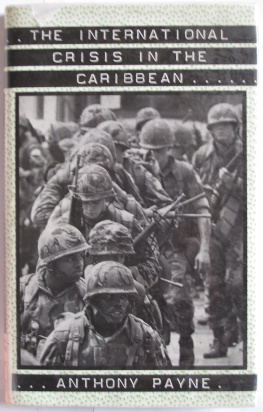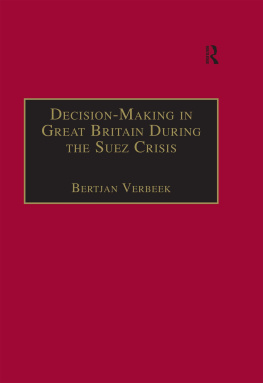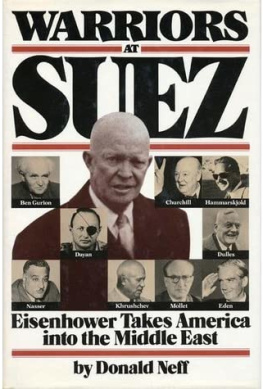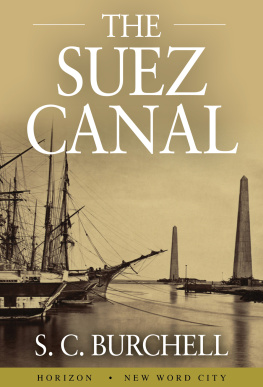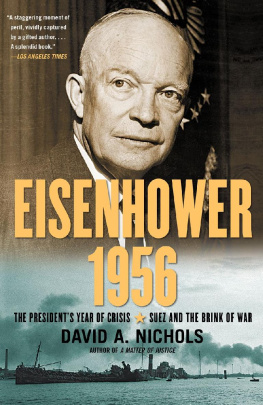The Suez Crisis
Controversy still surrounds the Anglo-French invasion of Egypt in 1956 and the role of senior British politicians such as the Prime Minister, Anthony Eden. This volume traces the history of Anglo-Egyptian relations since the opening of the canal, and Britain's wider interests in the region. The crisis itself, from its development to the invasion and the aftermath, is fully explored. The wider implications of the episode, both for Britain and on a global scale, are considered in detail.
A wide range of documentary evidence is carefully woven into textual analysis. Included are: key UK and US government sources; photographs, cartoons; diary entries; interviews, and extracts from newspapers. The significance of individual sources and their usefulness for historians is highlighted.
ROUTLEDGE SOURCES IN HISTORY
Series Editor
David Welch, University of Kent
OTHER TITLES IN THE SERIES
Resistance and Conformity in the Third Reich
Martyn Housden
FORTHCOMING
The Russian Revolution
Ronald Kowalski
Italian Fascism
John Pollard
The Holocaust
John Fox
The German Experience
Anthony McElligott
The Rise and fall of the Soviet Union
Richard Sakwa
First published 1997
by Routledge
2 Park Square, Milton Park, Abingdon, Oxon, OX14 4RN
Simultaneously published in the USA and Canada
by Routledge
270 Madison Ave, New York NY 10016
Transferred to Digital Printing 2005
1997 Anthony Gorst and Lewis Johnman
Typeset in Galliard and Gill by Keystroke, Jacaranda Lodge, Wolverhampton
All rights reserved. No part of this book may be reprinted or reproduced or utilized in any form or by any electronic, mechanical, or other means, now known or hereafter invented, including photocopying and recording, or in any information storage or retrieval system, without permission in writing from the publishers.
British Library Cataloguing in Publication Data
A catalogue record for this book is available from the British Library
Library of Congress Cataloging in Publication Data
Gorst, Anthony.
The Suez Crisis/Anthony Gorst and Lewis Johnman.
(Routledge sources in history)
Includes bibliographical references and index.
1. EgyptHistoryIntervention, 1956. 2. Great BritainForeign relations1945 I. Johnman, Lewis. II. Tide. III. Series.
DT107.83.G68 1997 965892
962.05'3dc20 CIP
ISBN 0415-114497
0415-114500 (pbk)
Series editor's preface
Sources in History is a new series responding to the continued shift of emphasis in the teaching of history in schools and universities towards the use of primary sources and the testing of historical skills. By using documentary evidence, the series is intended to reflect the skills historians have to master when challenged by problems of evidence, interpretation and presentation.
A distinctive feature of Sources in History will be the manner in which the content, style and significance of documents is analysed. The commentary and the source are not discrete, but rather merge to become part of a continuous and integrated narrative. After reading each volume a student should be well versed in the historiographical problems which sources present. In short, the series aims to provide texts which will allow students to achieve facility in thinking historically and place them in a stronger position to test their historical skills. Wherever possible the intention has been to retain the integrity of a document and not simply to present a gobbet, which can be misleading. Documentary evidence thus forces the student to confront a series of questions which professional historians also have to grapple with. Such questions can be summarised as follows:
1 What type of source is the document?
Is it a written source or an oral or visual source?
What, in your estimation, is its importance?
Did it, for example, have an effect on events or the decision-making process?
2 Who wrote the document?
A person, a group or a government?
If it was a person, what was their position?
What basic attitudes might have affected the nature of the information and language used?
3 When was the document written?
The date, and even the time, might be significant.
You may need to understand when the document was written in order to understand its context.
Are there any special problems in understanding the document as contemporaries would have understood it?
4 Why was the document written?
For what purpose(s) did the document come into existence, and for whom was it intended?
Was the document author-initiated' or was it commissioned for somebody? If the document was ordered by someone, the author could possibly have tailored his piece.
5 What was written?
This is the obvious question, but never be afraid to state the obvious.
Remember, it may prove more revealing to ask the question: what was not written?
That is, read between the lines. In order to do this you will need to ask what other references (to persons, events, other documents, etc.) need to be explained before the document can be fully understood.
Sources in History is intended to reflect the individual voice of the volume author(s) with the aim of bringing the central themes of specific topics into sharper focus. Each volume will consist of an authoritative introduction to the topic; chapters will discuss the historical significance of the sources, and the final chapter will provide an up-to-date synthesis of the historiographical debate. Authors will also provide an annotated bibliography and suggestions for further reading. These books will become contributions to the historical debate in their own right.
In The Suez Crisis, Anthony Gorst and Lewis Johnman plot the history and strategic importance of Suez and the events that led to Britain's withdrawal from the Persian Gulf Their skilful analysis of the sources they have selected reveals how Britain slowly came to recognise that it would have to scale down its global commitments and accept a more regional role focused on Europe. It is the contention of the authors that while the Suez crisis may not have caused the major changes in Britain's status in the world, it did act as a powerful catalyst of change. As this volume clearly indicates, Suez cruelly exposed the assumptions shared by most British politicians of the 1950s that the country remained a great power. After Suez the illusion of Britain as an independent world power could no longer be sustained.
David Welch
Canterbury 1996


